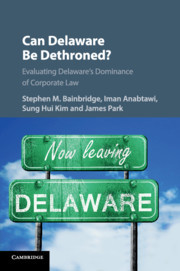Description
Can Delaware Be Dethroned?
Evaluating Delaware's Dominance of Corporate Law
Coordinators: Bainbridge Stephen M., Anabtawi Iman, Kim Sung Hui, Park James
Leading corporate lawyers and academics evaluate Delaware's dominance of corporate law and the challenges it now faces.
Language: English
Subject for Can Delaware Be Dethroned?:
Can Delaware Be Dethroned?
Publication date: 06-2019
Support: Print on demand
Publication date: 06-2019
Support: Print on demand
Can Delaware Be Dethroned?
Publication date: 01-2018
266 p. · 15.6x23.5 cm · Hardback
Publication date: 01-2018
266 p. · 15.6x23.5 cm · Hardback
Description
/li>Contents
/li>Biography
/li>
Delaware is the state of incorporation for almost two-thirds of the Fortune 500 companies, as well as more than half of all companies listed on the New York Stock Exchange, NASDAQ, and other major stock exchanges. This gives Delaware a seemingly unchallengeable position as the dominant producer of US corporate law. In recent years, however, some observers have suggested that Delaware's competitive position is eroding. Other states have long tried to chip away at Delaware's position, and recent Delaware legal developments may have strengthened the case for incorporating outside Delaware. More importantly, however, the federal government is increasingly preempting corporate governance law. The contributors to this volume are leading academics and practitioners with decades of experience in Delaware corporate law. They bring together a variety of perspectives that collectively provide the reader with a broad understanding of how Delaware achieved its dominant position and the threats it faces.
1. Introduction Stephen M. Bainbridge; 2. Product differentiation in the market for corporate law: how to design a regulatory alternative to Delaware corporate law Sean Griffith; 3. Corporate charter competition Lynn LoPucki; 4. Delaware's dominance: a peculiar illustration of American federalism Robert Thompson; 5. The failure of federal incorporation law: a public choice perspective Sung Hui Kim; 6. Delaware and Santa Fe industries v. Green James Park; 7. Interest group analysis of Delaware law: the corporate opportunity doctrine as case study Stephen M. Bainbridge; 8. The trouble with Trulia: re-evaluating the case for fee-shifting William B. Chandler and Anthony Rickey; 9. Dominance by inaction: Delaware's long silence on corporate officers Lyman Johnson; 10. Delaware primacy for limited partnerships Christine Hurt; 11. Why Delaware has endured, should endure, and yet may not endure Charles Elson; 12. Delaware's continued resilience: the next hundred years A. Gilchrist Sparks.
Stephen M. Bainbridge is William D. Warren Distinguished Professor of Law at the University of California, Los Angeles School of Law. His most recent books include: Business Associations: Cases and Materials on Agency, Partnerships, and Corporations (9th edition, 2015, with Klein and Ramseyer); Corporate Governance after the Financial Crisis (2012); Mergers and Acquisitions (3rd edition, 2012); and The New Corporate Governance in Theory and Practice (2008).
Iman Anabtawi is Professor of Law at the University of California, Los Angeles School of Law. Her article, 'Fiduciary Duties for Activist Shareholders' (with Lynn Stout, 2008), was selected as one of the Top 10 Corporate and Securities Articles of 2008 by The Corporate Practice Commentator.
Sung Hui Kim is Professor of Law at the University of California, Los Angeles School of Law. Her scholarship has appeared in Capital Markets Law Journal, Cornell Law Review, UCLA Law Review, and Securities Law Review.
James Park is a Professor of Law at the University of California, Los Angeles School of Law. His articles have appeared in the California Law Review, Duke Law Journal, the Journal of Empirical Legal Studies, Michigan Law Review, and the UCLA Law Review.
Iman Anabtawi is Professor of Law at the University of California, Los Angeles School of Law. Her article, 'Fiduciary Duties for Activist Shareholders' (with Lynn Stout, 2008), was selected as one of the Top 10 Corporate and Securities Articles of 2008 by The Corporate Practice Commentator.
Sung Hui Kim is Professor of Law at the University of California, Los Angeles School of Law. Her scholarship has appeared in Capital Markets Law Journal, Cornell Law Review, UCLA Law Review, and Securities Law Review.
James Park is a Professor of Law at the University of California, Los Angeles School of Law. His articles have appeared in the California Law Review, Duke Law Journal, the Journal of Empirical Legal Studies, Michigan Law Review, and the UCLA Law Review.
© 2024 LAVOISIER S.A.S.




